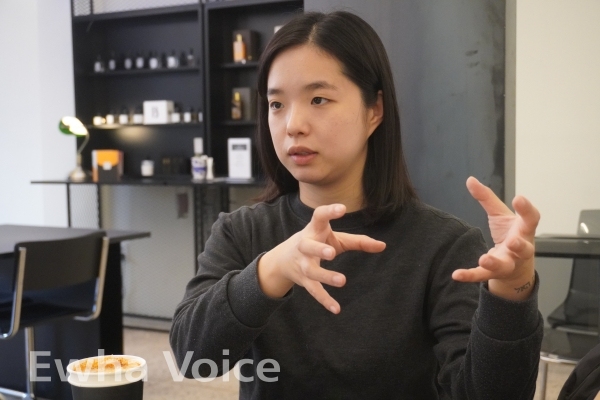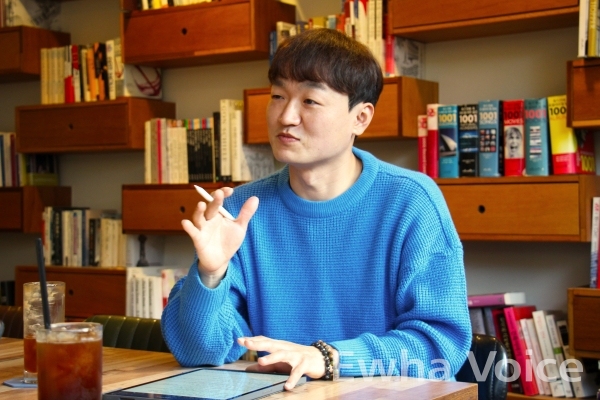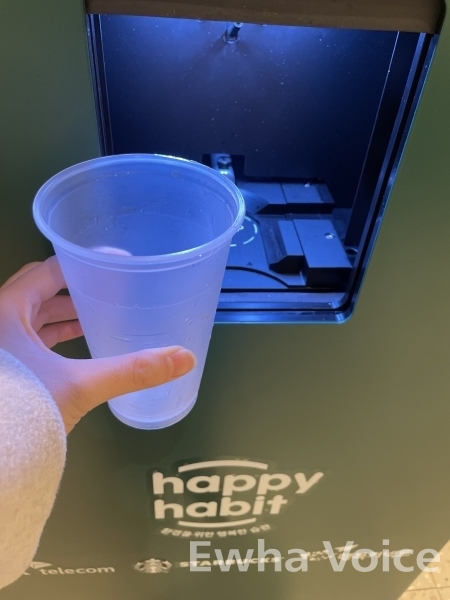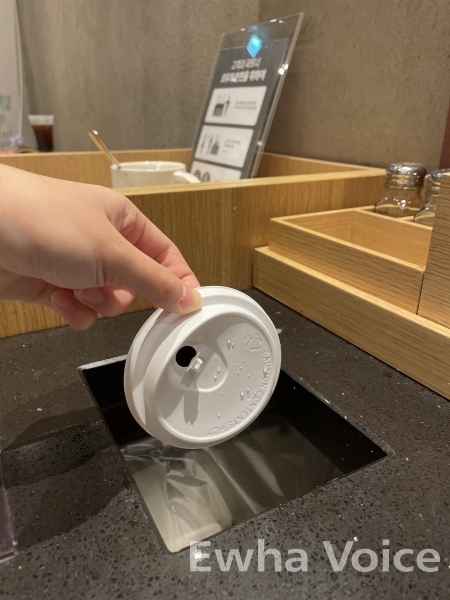The American multinational coffee franchise Starbucks released its new reusable cups as part of their 50th anniversary event, on Sept. 28. However, contrary to many people's expectations, the coffeehouse faced accusations of “greenwashing,” which refers to the act of misleading consumers into believing that the company’s products are sustainable and eco-friendly. Although Starbucks has claimed that the cups can be reused up to 20 times, customers have questioned if the plastic cups are actually reusable and eco-friendly.
Greenwashing is already deeply embedded in our lives. Some cases are closely related to consumer life, like Starbucks, whose greenwashing is overt, but most companies’ efforts are not as noticeable. Greenwashing not only hinders consumers’ efforts to take up eco-friendly consumption habits but also increases pollution. Advertising Standards Authorities (ASA) has already issued six implementation guidelines that companies must follow before engaging in eco-friendly marketing. To examine the issue further, Ewha Voice interviewed activists who are putting their efforts to prevent greenwashing in their respective positions.
Speak out against the mighty: Kang Eun-bin from Youth Climate Emergency Action

There have been many organizations and extracurricular activities focusing on the climate crisis leading up to this day. Nevertheless, most of them have been one-off projects or simply treated as part of participants’ careers or specifications. On the other hand, some consider the climate crisis directly related to our future and fear that the actions taken by society are not sufficient. A group of such people gathered together to form Youth Climate Emergency Action (YCEA), an organization prepared to risk their lives to fight against the climate crisis.
“For most people, the climate crisis is literally a change in weather, such as global warming,” said Kang Eun-bin, an activist involved in YCEA. “However, we are looking at the social phenomena that arise from climate change as a climate crisis as well, and we also think of solving social inequalities caused by climate change as our challenge.”
YCEA does not focus on individual efforts like most environmental organizations. Rather, they send declarations to companies and governments and fight against them. Last February, they poured green paint on the logo sculptures in front of Korea’s flagship coal plant manufacturer's building to expose their greenwashing: building coal-fired power plants overseas while declaring themselves as an eco-friendly company. The organization was served with a lawsuit in response. Nonetheless, Kang said they will continue to speak out against businesses and governments.
“Individual efforts are not enough,” Kang said. “At first, we sent a declaration to the embassy, contacted the members of parliament, and tried to work behind the scenes. Then, we found out that people tend to focus on social issues. They are alerted only when social controversy happens. That is when social discourse forms and expands. So we started to take direct actions against large companies.”
YCEA does not carry out zero-waste movements and activities related to resource allowances because disposable products are sometimes inevitable such as at disaster sites. Asking workers at these sites why they do not use reusable tumblers is nonsense and unrealistic. Kang said they could not impose moral standards on those who are surviving climate disasters.
“It is undoubtedly important for each person to practice morality, such as reducing the disposable usage, but that barely changes the system,” Kang said. “Demanding and pressuring those who are responsible for and authorized to address climate change is the key to resolving the climate crisis. We need to create a world without structural violence, in which we cannot contribute to climate change.”
Kang referred to Korea Electric Power Corporation (KEPCO), the country's well-known public electricity provider, as the most shocking greenwashing case. Along with the flow of companies responding to climate change, KEPCO also held an eco-friendly campaign, giving gifts to people who posted their pictures using reusable tumblers on social media. The company even announced plans to phase out coal-burning energy production to preserve natural resources. However, last summer, KEPCO began giving talks on coal-fired electricity export projects to Vietnam and Indonesia.
“Greenhouse gases from Vietnam not only affect that country but also other countries,” Kang said. “The world must prepare for climate change together. However, KEPCO’s decision to phase out coal in Korea and proceed with coal-fired projects in Vietnam is contradictory. It is greenwashing to announce that KEPCO as a company responding to climate change but does the opposite.”
She mentioned a new system as a structural measure to prevent such greenwashing. When she and other environmental activists gathered to find a way to file a lawsuit against companies contributing to climate change, it was impossible to do so in Korea's jurisdiction system. Environmental policies such as greenhouse gas reduction goals are responsible for the government, not for companies.
“We need to regulate corporate activities within the ecological environment,” Kang said. “Imagine there is a cement factory. The company being able to pursue any business based on its capital, we need a new system for it. ‘Greenhouse gas emissions of your business exceed the limits that the Earth can afford, so we disapprove of it.’ The government should be able to do this.”
For young people, Kang suggested that the climate crisis should be the default of life because it is not a vague thing that will come and affect us someday, but is already underway.
“We think our future will be the same as our parents’ past 30 years, but it is not in reality,” Kang said. “It is getting hotter and hotter every year, and there are signs of extreme weather. COVID-19 is also part of the change. We have not experienced it yet, but it is clear that it will get worse in the future.”
She said that finding a job is important, but the place of our lives to work and live on--the Earth--is also crucial.
“The base is collapsing, isn’t it?” Kang said. “To keep our lives and future safe, we have to speak out for the climate crisis. That is what protects our lives.”
Running an eco-friendly business and greenwashing: International development cooperation specialist Oh Eui-seok

Examining and observing certain issues from the inside is definitely different from doing so from the outside. The same goes for greenwashing. By experiencing the process first-hand, individuals running companies and corporations feel the impact of the environmental problems caused by the production process more quickly than the consumers and the general public do.
Oh Eui-seok, an international development cooperation specialist involved in various activities of public interest including major in-field projects in developing countries, previously launched Korea’s first rainwater craft beer “Helles Lager - Heaven’s edition” in response to the climate crisis. The rainwater craft beer was made with purified rainwater instead of regular tap water.
Previously working on the international development cooperation projects at an environmental organization, Oh worked on a project distributing drinking water facilities based on rainwater in areas lacking safe drinking water. While working on such projects, he came up with the idea of utilizing rainwater in Korea as it also has been encouraged by the UN as a way to combat climate change.
Oh revealed that he used the rainwater beer as a medium to challenge the stigma attached to rainwater in Korea due to acid rain and fine dust issues. He said that turning rainwater into beer made it an attractive business item and that it caught the public’s eyes since many beer lovers like to try out various types of beers.
However, agonizing over the issue of greenwashing, Oh stopped making rainwater beer at the end of 2019. Oh revealed that he started to be concerned whether this product could really be a solution to climate change and if their beer had a smaller carbon footprint than preexisting beers in the market. He felt that his business was not enough of a response to the climate crisis and could rather be a form of greenwashing.
The four main ingredients of beer are barley, yeast, hops, and water. However, in Korea, all the ingredients except for water are imported, which already increases the carbon footprint. In addition, the beer business itself is very energy-intensive as the product has to be repeatedly boiled, cooled, and matured in a cold storage for months. This leads businesses to consume a huge amount of electricity made by coal-fired electrical power plants. Facing such challenges, Oh felt the limitation of the infrastructure and environment in the Korean beer industry.
“Also, in order to supply the purified rainwater to the brewery, we had to use a diesel water truck,” Oh said. “Witnessing the truck emitting the gray exhaust from behind, I had my doubts, questioning my response to climate change. It was already wrong from that exhaust gas. I felt our business would be no different from other greenwashing companies unless we could overcome such limitations.”
At the time of closing the business, Oh had publicly shared his concerns on greenwashing on the company’s social media. Admitting that something is wrong is difficult, but revealing it is quite another. Accordingly, when Ewha Voice asked about any difficulties Oh faced to come out and openly talk about the issue, to our surprise, Oh rather pointed out how common stance and mindset of corporations to solely put monetary profit as their utmost priority is what turned the earth into how it is today.
“It would not have mattered if we did not care about how our actions would affect the world and only focused on making money,” Oh said. “But, because that was not how we wanted to run our business, we did not have any difficulties to openly share our concerns about how our business could be greenwashing. We did not want to be the one to take advantage of this green marketing trend because we want to do it more sincerely and conscientiously so that it is not embarrassing before the future generations.”
Furthermore, Oh revealed that individuals running eco-friendly businesses may end up choosing money before the environment and eventually give up protecting the environment. This is because there are more people around them to financially advise them on their profit than those who can advise them environmentally.
“The more actively you destroy the environment, the more money you can earn,” Oh said. “Since there are many experts who are good at doing so around you, you may be greenwashing without knowing, being exposed to such profit-seeking environment. Thus, I would like to suggest talking to experts who can advise you on environmental issues when having any environmental concerns and uncertainties if you are being too idealistic but realistic. It will help balance between the environment, growth, and eco-friendly performance of the company.”
Oh also elaborated on the essence of considering “climate shadows” in the businesses. He explained the concept of climate shadows through Mongolia’s cashmere industry and stated that though carbon footprint is important, people need to think a lot about how businesses affect the environment in a larger context.
“For instance, since the sheep industry, where you get the cashmere from, has a long carbon footprint, companies could do marketing that they lowered carbon economic development using solar power,” Oh said. “However, as the business grows, the problem of local water pollution or soil pollution becomes more serious, leaving the environmental damage overweighing the profits.”
Moreover, Oh commented that the most important thing in combating greenwashing is the constant checks of consumers. For consumers who want to raise their guard against greenwashing, he suggested a few useful ways to tackle greenwashing: doubting companies that keep encouraging consumption through eco-friendly marketing, cutting back the desire to make unnecessary consumption as a consumer, and voting for politicians who boldly respond to the climate crisis.
Although his rainwater beer business has been put on hold, his journey to save the environment continues. He is currently working on two environment-related projects: hosting a two-year education session for individuals in the international development cooperation to strengthen their climate capabilities and forming a public-private governance to discuss the city’s response to climate change and put it into action.
Oh concluded the interview encouraging the readers to free themselves from the guilt of not being able to lead an environmentally friendly life. It is easy to fall into nihilism and depression while looking into environmental issues and realizing that you are a “climate-villain” or “environmental-villain” just by living in Korea.
“Think of it as an action for your own good, not for changing the world,” Oh said. “Because whether the whole world changes or not does not depend on you and your actions, I hope you think that you act to live a healthier and more conscientious life for yourself.”
Could Starbucks wipe off its disgrace of “greenwashing”?

Starting on Nov. 6, Starbucks Korea got rid of single-use plastic cups at a dozen of its locations in Seoul as part of the company’s ongoing efforts to reduce plastic waste.
12 Starbucks stores around Seoul City Hall serve beverages only in mugs, reusable cups, or personal tumblers. The reusable cups cost 1,000 won and can be refunded in cash, Starbucks reward points, or Happy Habit app points when returning the cups. Customers can return them to any of the 12 locations using any the 14 cup return machines throughout the city.

Photo by Yoon Chae-won
Seoul is not the first city the chain has decided to move away from single-use plastic cups. Since this July, the company has stopped using disposable plastic cups at four of its locations on Jeju Island.
On Nov. 11, Ewha Voice made a visit to two Starbucks stores each at Seoul City Hall and Mugyoro to capture the chain’s system to go plastic-free in-depth.

Photo by Yoon Chae-won

